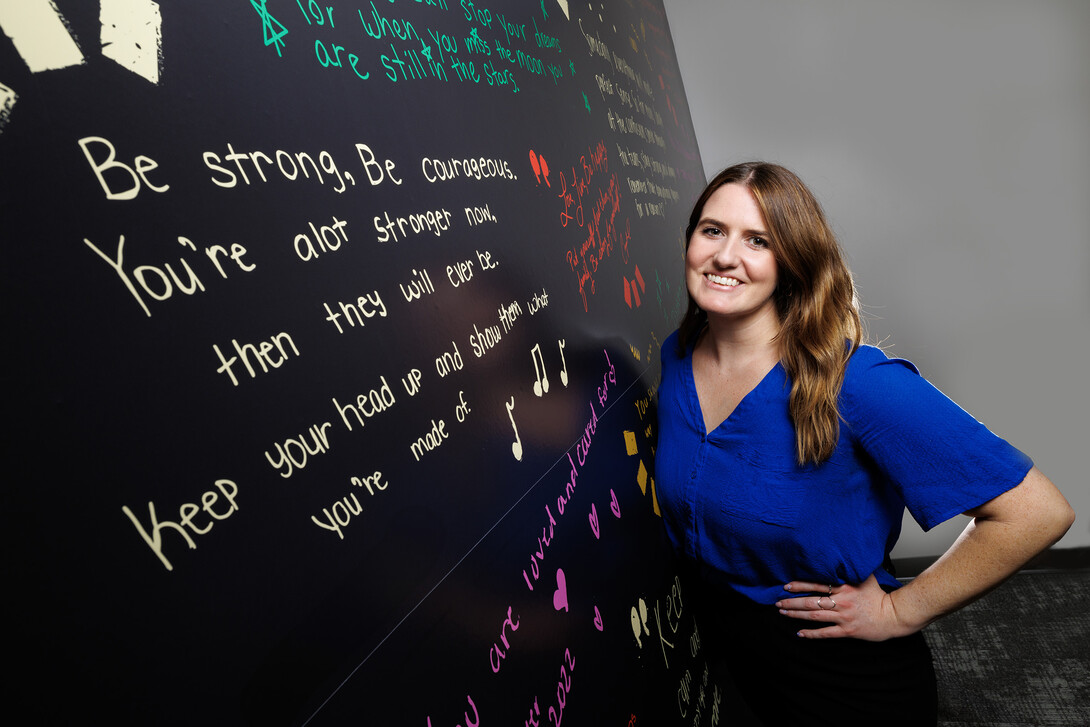
For the last four years, Gina May has brought hope and healing to families facing trauma and abuse.
May is a doctoral student in the University of Nebraska–Lincoln’s Clinical Psychology Training Program. Through Project SAFE — a clinical services, research and training program developed by David Hansen, professor of psychology — May is among a group of graduate students that offers mental health services at BraveBe Child Advocacy Center to children who have experienced sexual abuse and their non-offending families and caregivers.

The therapy provided by students in Project SAFE is just one part of a broad range of services BraveBe provides for families who have experienced trauma, and May is thankful for everything she’s learned through the partnership with the center.
“No one ever thinks they’re going to be the family going through something like this that brings them to BraveBe, and yet they find themselves there,” May said. “And it’s powerful to see what a difference it can make when we’re able to bring all the systems and agencies together, so a family doesn’t have to. It’s challenging work, but it’s very rewarding.”
BraveBe, which was formerly known as the Lincoln-Lancaster County Child Advocacy Center, is one of more than 145 agencies that receive financial support through the UNL Combined Campaign for Health and Human Services. It is an invaluable resource for any family that is facing trauma, said Paige Piper, BraveBe’s executive director.
“We serve as the critical intervention point for families in crisis — addressing issues such as sexual abuse, physical abuse, neglect, or children who have witnessed violent crimes” she said. “When trauma occurs, the best thing that we can do is rally around and provide support to that child and family, and we do that through specialized services that help address the physical, mental and emotional aspects of abuse.
“We are a partner that says to a family, ‘I'm so sorry for what you've been through. We know you may be scared, and you don't know what's going to happen next, but you don't have to take that journey alone. We're going to support you and help you navigate each next step, no matter what that next step is.’”
Piper said the United Way funding makes a huge impact in southeast Nebraska.
“Our funding from United Way goes directly to our advocacy program to be able to provide direct resources and support to kids and families, as well as court advocacy,” Piper said. “The many years of support we’ve received has helped impact the lives of thousands of children.”
BraveBe was formally founded in 1996, and a physical location opened in 1998. Initially serving Lancaster County, the center now serves children in 17 counties in southeastern Nebraska.
In 2023, BraveBe served a total of 8,404 children with 4,489 children receiving response services, which include individual, family and group therapy sessions — many provided by graduate students in Project SAFE.
Hansen developed Project SAFE in 1996, and began a partnership with the center when it opened its original location. The partnership has benefitted more than a hundred graduate students on their path to becoming licensed mental health providers and has helped countless families.
“Project SAFE has been our longest-term partner,” Piper said. “They are a significant partner in our mental health services and intervention for children who have experienced sexual abuse. A lot of families that we work with do not have the financial resources to access mental health care, and so being able to provide them with support from Project SAFE makes a huge difference in the mental and emotional recovery from trauma that they experience.”
For May, providing mental health services and now serving as the clinical coordinator for Project SAFE at BraveBe has informed her future career aspirations.
“My goal is to integrate practice and research to then inform policy and systems,” May said. “Honestly, my work with BraveBe has been so monumental in establishing that career path. I’m interested in figuring out how we can establish more programs and services like this. I’ve seen how a program can be developed with and for the community, and it works really well.”







